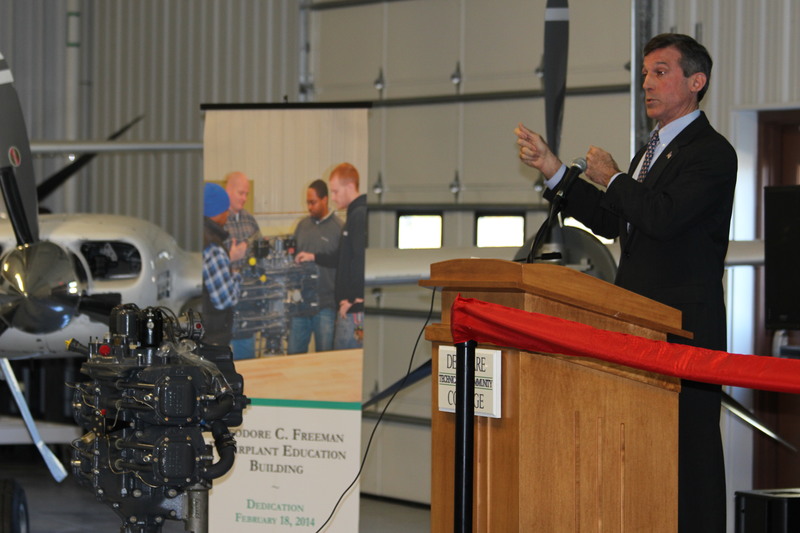Carney talks Sussex County

The November elections are months away, but Congressman John Carney recently stopped by the Cape Gazette offices to discuss Sussex County issues.
Carney is in the second year of his second term as Delaware's only representative in the U. S. House of Representatives.
Promoting manufacturing jobs in Sussex is among his top priorities and continuing the expansion of the Sussex County Airport near Georgetown is a key economic priority in Sussex, he said.
The county broke ground in August 2012 on a $4.4 million project that extended the 5,000-foot-long main runway at the airport an additional 500 feet.
The extension is the first step in a larger $25 million, multiphase plan to modernize the airport, expected to be completed by 2017. Improvements include redesigned taxiways, improved lighting and a second 500-foot extension resulting in a 6,000-foot runway.
The longer runway will allow larger aircraft to land at the airport, including Boeing 757s. Boeing 737s models already fly to and from the airport for interior work at Georgetown-based PATS Aircraft Systems, which has plans to service the larger Boeing 757s.
“This is being driven by private industry,” said the congressman.
The airport is also home to Delaware Technical Community College’s aircraft maintenance education program, which trains airport mechanics for jobs at PATS.
Farm bill to help chicken farmers
Carney said the recently passed Farm Bill offers some good news for chicken farmers. The state's poultry industry is the strongest it's been in a number of years, and the bill included two provisions that will continue to benefit Delaware poultry farmers into the future, he said.
The first, authored by Sen. Chris Coons, co-chair of the Senate’s Chicken Caucus, will assist poultry growers during uncertain economic times. The provision commissions a pair of studies on the feasibility of insurance programs to protect poultry growers from catastrophic loss, such as disease outbreaks, and from bankruptcies of poultry integrators.
The second, authored by Sen. Tom Carper, prioritizes research at the Agriculture Department to improve the efficiency, digestibility and nutritional value of corn, soybean meal, cereal grains and grain byproducts as feed for the poultry and animal agriculture industries.
Carney also discussed what he called “the real skills gap” between the high-tech jobs in the marketplace and the level of preparedness of students entering that marketplace.
Carney said it's essential to educate both parents and students on the importance of the science, technology, engineering and mathematics fields.
“Giving parents and students the kind of information they need would be a good start,” he said.
He credited Delaware Technical Community College for offering Sussex County students a skill set they'll need for the growing high-tech industries.
Carney said we don't live in a demand-control economy, so while it would be nice to say we need 30 percent of a graduating class to be getting into these fields, that's not how the skills gap will be solved.
There's a disconnect out there between between the jobs available and the level of education our students are receiving, the congressman said, warning that we live in a global economy these days, and the employers will look worldwide to fill open positions with qualified workers.
Chris Flood has been working for the Cape Gazette since early 2014. He currently covers Rehoboth Beach and Henlopen Acres, but has also covered Dewey Beach and the state government. He covers environmental stories, business stories and random stories on subjects he finds interesting, and he also writes a column called Choppin’ Wood that runs every other week. He’s a graduate of the University of Maine and the Landing School of Boat Building & Design.
























































